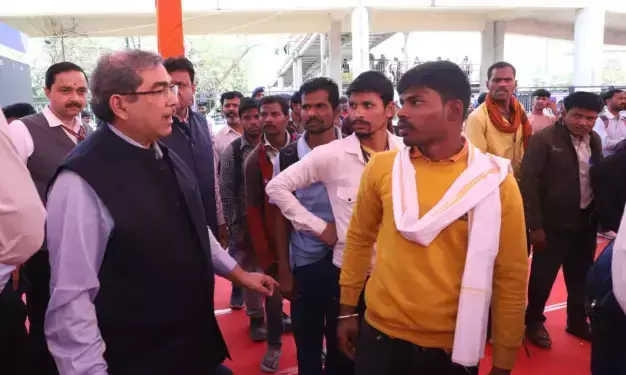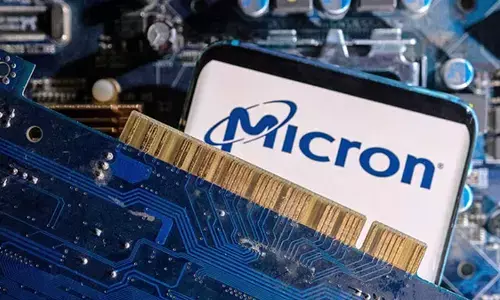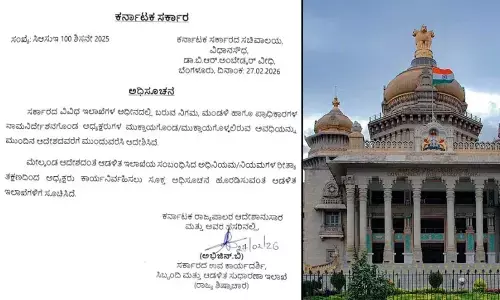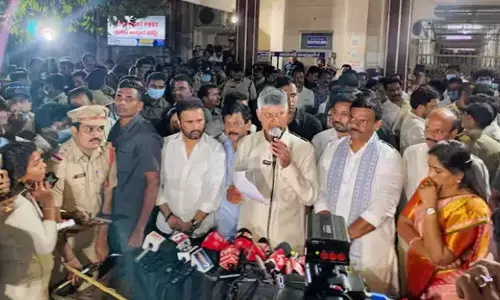A focus on Research, Technology Development

A focus on Research, Technology Development
After extensive deliberations with a large number of people from different sectors, teachers, educationists, policy makers, institutions and voluntary organisations, the Government of India approved the National Education Policy 2020, drafted by a committee headed by Dr. Kasturirangan
After extensive deliberations with a large number of people from different sectors, teachers, educationists, policy makers, institutions and voluntary organisations, the Government of India approved the National Education Policy 2020, drafted by a committee headed by Dr. Kasturirangan. The NEP-2020 is a significant milestone in the history of Indian education. The NEP is complete, comprehensive and visionary and plays a vital role in shaping the future of India.
The National Education Policy (NEP) laid the foundation for a 'New India' of the 21st century, Prime Minister Narendra Modi said during his inaugural speech of a conclave on "Transformational Reforms in Higher Education under the NEP".
The New Education policy places a welcome emphasis on a holistic, student – centric, flexible system that aims to transform India into a vibrant knowledge and Science & Technology – based society. The NEP is an appropriate balance of Indian ethos, Indian culture, pride and acceptance of the best ideas and learning practices from across the globe. The vision of NEP-2020 is truly global and at the same time Indian.
The policy gives a fillip to holistic education by envisioning the much needed and long awaited convergence of science and arts streams. NEP's sharp focus is on research, multi-disciplinary approaches and use of technology, and professional upgradation of teachers' competence to transform the landscape of Indian education. Undoubtedly, the NEP is poised to yield outstanding results in the fields of higher education, research and innovations, Science & Technology development in the country.
Many of you are aware that there had been no changes in the education system for many years, resulting in the promotion of a 'herd mentality' in the Indian society instead of the values of the curiosity and the imagination.
Higher education is a critical contributor to sustainable livelihood and economic development of the nation. Higher education also plays a large and equally important role in developing India. Higher education aims to serve as a hub for developing ideas and innovations that enlighten individuals and help propel the country forward socially, scientifically, technologically and economically.
It is a fact that science and technology is the established currency in the geo-political world. Any country that has made advances in prosperity has invariably depended on Science and Technology. England became a world power; it was because of the industrial revolution. U.S became a superpower, it was primarily because of its technology, whether it is in transportation, agriculture, high-tech industry, medicine etc.
Higher education must form the basis for knowledge creation and innovation in the nation and thereby contribute deeply to a growing national economy. NEP aims to provide students with broad-based multidisciplinary education and 21st century skills, while developing specialised knowledge with true disciplinary rigour. We need to recognise that a student's knowledge base must be sufficiently flexible to cope with a 21st century job scenario.
It should be emphasised that higher education must build expertise that society will need over the next 25 years and beyond. Simply, tailoring people into jobs that exist today, but that are likely to change or disappear after some years, is suboptimal and even counterproductive.
India's higher education has developed rigid boundaries of disciplines and fields, along with a narrow view of what constitutes education. Rigid boundaries and silos violate the basic requirement of good higher education.
Many members of the academic community in India are not conducting scholarly research is an enormous lost opportunity for research and innovation in the country. On the education side, it is difficult to have outstanding higher education and teaching in an environment where knowledge creation is not taking place; indeed, how can students be taught to innovate in a location where innovation is not on the agenda?
Very little funding is available for novel research in most of the Higher Educational Institutions, especially for research in important multidisciplinary and cross-disciplinary areas.
The needs of the 21st century require that liberal broad-based multidisciplinary education become the basis for higher education.
This will help develop well-rounded individuals that possess critical 21st century capacities in fields across arts, humanities, sciences, social sciences, and professional, technical, and vocational crafts, and of course, rigorous specialisation in a chosen field or fields.
The liberal arts educations given by the Ivy League Universities have played a major role in the development of the United States for a number of years, and Tsinghua is playing a major role in the development of China in recent years. In the past, Nalanda produced scholars of the highest quality for many centuries, many of whom changed the world history.
While preparing our students to participate in world affairs through providing them with learning experiences that cut across countries and cultures, we must also attract students from other countries to participate in our higher education programmes. India has had an illustrious history in the internationalization of higher education.
Two-thirds of the economic growth of Europe from 1995 to 2007 came from research and innovation. It also accounted for 15 per cent of all productivity gains in Europe between 2000 and 2013.
Other countries across the globe, including the United States, have reached similar conclusions on the criticality of R&D investments for their economic growth. Indeed, there is a clear correlation between the rates of R&D investment of developing/developed nations and various measures of their prosperity such as GDP per capita.
Unfortunately, levels of R&D investment in India have not grown, but instead have steadily dropped over the last decade – from 0.84 percent of GDP in 2008 to around 0.69 percent in 2014, where it remains today.
The abysmally small proportion of GDP that India currently invests in R&D is naturally reflected in its research-output numbers. The number of researchers per lakh of population is shockingly only 15 in India, compared to 111 in China, 423 in the United States, and 825 in Israel. As a direct consequence, India severely lags behind in the number of patents and publications produced.
Research and innovation at Institutions in India, particularly those that are engaged in higher education, is critical. It is also extremely important to note that only the government can have the perspective to drive the research that will result in innovations which will facilitate economic growth.
There are a number of impediments to conducting research in India at the current time. As a consequence, many talented Indians wishing to innovate often leave the country. Reducing these impediments to research and innovation will be the key to increasing home-grown research, retaining talent in the country, and again attaining a vibrant research ecosystem by which India can solve some of its most pressing problems and grow its economy, and intellectual and material prosperity.
Lack of funding sources, both public and private, to support outstanding research and innovation initiatives remains a major issue. All public and private sector enterprises could contribute a small percentage; say at least 0.1 percent of their annual profits to research (as donations).
This could be done within or outside CSR funds, and such contributions could be given suitable tax incentives.
Learning from Japan's post-war success, countries like South Korea, Taiwan, Singapore and Hong Kong made huge technological and industrial strides in the 1970's and 80's. Unfortunately, India might have missed the bus in many of these technologies in which the US, Europe and China have established perhaps insurmountable leads.
Yet, self-reliant capabilities in electric and fuel cell vehicles, energy storage systems, solar cells and modules, UAVs, AI, robotics and automation, additive manufacturing (3D Printing) biotech / pharma, healthcare and others are well within reach of the country.
How long we can be exporters of raw materials? India needs to be hub for quality goods and products. Large-scale concerted endeavours would, however, be required, since self-reliance will not happen by itself.
State-funded R&D including basic research by the Public Sector Undertakings (PSUs) and research institutions and Universities needs to be scaled up significantly well above the dismal 1 per cent of the GDP currently.
India's major public expenditure on education needs to be substantially ramped up, including skill development. It is to be realised that no country has achieved self-reliance without education of high quality.
I am very optimistic and confident that implementation of the National Education Policy – 2020 definitely contributes to technology development and quality education and will lay the foundation for 'New India' of the 21st century.
(The author is Pro Vice- Chancellor, SRM University-AP, Amaravati)










